The Importance of Precision Engineering in High-Torque Gearboxes
When it comes to high-torque gearboxes, precision engineering is crucial for optimal performance and longevity. With the right design, manufacturing, and assembly techniques, high-torque gearboxes can facilitate smooth and efficient power transfer while minimizing wear and tear. This article explores 10 key prospects of precision engineering in high-torque gearboxes.
Advanced Material Selection
Precision engineering in high-torque gearboxes often involves carefully selecting materials to optimize strength, durability, and resistance to heat and wear. Some common materials include case-hardened steel, alloy steel, and even ceramics. Specific coatings and treatments may also be applied to enhance performance and decrease friction.
Thorough Design and Prototyping
Before manufacturing even begins, precision engineering in high-torque gearboxes requires thorough design and prototyping to ensure proper fit, alignment, and clearance. This often involves advanced software simulations, rapid prototyping techniques, and physical testing to validate performance and identify any potential issues.
Precision Machining and Assembly
Precision engineering in high-torque gearboxes involves intricate machining and assembly techniques to ensure accurate positioning and alignment of gears and other components. This includes precision grinding, honing, lapping, and even laser alignment to ensure maximum performance and longevity.
Specialized Lubrication Techniques
High-torque gearboxes require specialized lubrication to protect against wear and damage. Precision engineering often involves developing lubrication strategies that can handle high loads and high temperatures while minimizing friction and reducing the risk of contamination.
Custom Bearing Solutions
High-torque gearboxes require specialized bearings that can handle high loads and provide maximum stability and accuracy. Precision engineering often involves developing custom bearing solutions that are specifically designed for the particular application and performance requirements of the gearbox.
Advanced Heat Treatment
High-torque gearboxes generate a significant amount of heat during operation, which can lead to premature wear and damage if not properly managed. Precision engineering often involves advanced heat treatment techniques to enhance the strength and durability of the gears and other key components.
Quality Control and Testing
Precision engineering in high-torque gearboxes requires rigorous quality control and testing to ensure optimal performance and longevity. This often includes physical testing, as well as advanced non-destructive testing techniques to identify any potential flaws or defects before they become issues.
Flexibility and Customization
Precision engineering in high-torque gearboxes often involves developing flexible and customizable solutions that can be tailored to the specific needs of the application. This may involve selecting different materials, coatings, or lubrication strategies depending on the operating conditions and performance requirements.
Ongoing Maintenance and Support
Even with the best precision engineering, high-torque gearboxes require ongoing maintenance and support to ensure long-term performance and reliability. Precision engineering often involves developing comprehensive maintenance plans that include regular inspections, lubrication, and replacement of worn or damaged components.
Conclusion
Precision engineering is critical to the performance and longevity of high-torque gearboxes. From material selection to design and prototyping, precision machining and assembly, custom bearing solutions, specialized lubrication techniques, advanced heat treatment, and ongoing maintenance and support, precision engineering can help ensure that high-torque gearboxes operate smoothly and efficiently for years to come.

